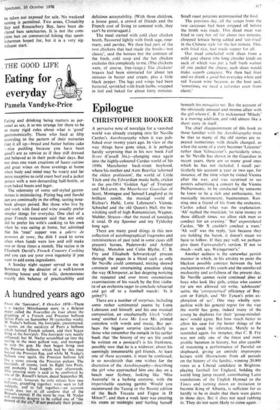Epilogue
CHRISTOPHER BOOKER
A pervasive note of nostalgia 'for a vanished world was already creeping into Sir Neville Cardus's Autobiography when it was pub- lished over twenty years ago. In view of the way things have gone since, it is perhaps hardly surprising that in his new book Full Score (Cassell 36s.)—plunging once again into the highly-coloured Cardus world of his 1890s Manchester back-street boyhood, where his mother and Aunt Beatrice 'adorned the oldest profession', the world of Little Titch and the Edwardian music halls, cricket in the pre-1914 'Golden Age' of Trumper and McLaren, the Manchester Guardian of Scott, Montague and Samuel Langford at its brilliant zenith, the musical world of Richter's Halle, Lotte Lehmann's Vienna, Schnabel and the old Queen's Hall, the be- witching spell of high Romanticism. Wagner, Mahler, Strauss—that the mood of nostalgia it total. 0 my Spooner and my Tyldesley long ago.
There are many good things in this new collection of autobiographical fragments and reminiscences of past (and in some cases still present) heroes. Paderewski and Arthur Malley. Menuhin and Colin Blythe, C. B. Fry and Elizabeth Schwarzkopf process through the pages in a blend such as only Sir Neville could command, mixing shrewd comment and entertaining anecdote along the way (Klemperer, at last deigning noticing the repeated and ever more ostentatious examinations of his watch by the first violin- ist of an orchestra eager to conclude rehearsal and get off to a football match: 'Es it going?').
There are a number of surprises, including some rather sentimental poems by Lotte Lehmann and himself, and his one musical composition, an unashamedly kitsch 'waltz song' entitled Love Me Love Me, printed complete with words and music. But per- haps the biggest surprise (particularly to those who remember the remark in his earlier book that 'the history of my sex life could be written on a postcard') is his frankness, possibly now that he is a widower, about his seemingly innumerable girl friends. At least one of these accounts, it must be confessed, is so novelettish that one wishes for the discretion of the Autobiography—describing the girl who approached him one day on a beach near Sydney, looking like 'Miss Australia' in a bathing costume, with the imperishable opening gambit 'Would you recommend the Tausig or the Flusoni edition of the Bach Toccata and Fugue in 13 Minor?', and then a week later was entering his room at 'midnight and hurling herself beneath his mosquito net. But the account of the obviously unusual and intense affair with the girl whom C. B. Fry nicknamed 'Milady' is a moving addition, and told almost like a short story in itself.
The chief disappointment of this book to those familiar with the Autobiography must be that so many of the old stories are re- peated (sometimes with details changed, as when the scene of a story becomes 'Leicester' rather than 'Gloucester). particularly since, as Sir Neville has shown in the Guardian in recent years, there are so many good ones which he has not included. I recall par- ticularly his account a year or two ago, for instance, of the time when he visited Vienna after the war, and was surprised to see posters advertising a concert by the Vienna Philharmonic, to be conducted by someone he knew to be a rich and enthusiastic, but musically incompetent, businessman. Run- ning into a friend of his from the orchestra. Cardus asked what was the explanation. `Ah' replied the musician. 'to raise money in these difficult times, we allow rich men to conduct for an evening.' But' expostulated Cardus, `Mr X couldn't conduct a tram.' `Ah well' was the reply, 'just because they are holding the baton, it doesn't mean we have to follow. If they pay well, we perhaps give them Furtwangler's version. If not so much—well, say, Weingartner's.'
Another sadness is the somewhat pettish manner in which, in his anxiety to paint the blackest possible contrast between the lost enchantments of his youth and the unrelieved mediocrity and awfulness of the present day, Sir Neville cannot resist continual jibes at boys who look like girls, critics who cannot (or are not allowed to) write, 'adolescent' satire, the 'computerised' efficiency of Boy- cott or Edrich. and `Mr Tynan's prim ex- ploration of sex'. One may wholly sym- pathise with his general regret for the way the world has gone, indeed many of the young he deplores for their 'group-minded- ness' would agree. But how much better to allow his case for the better things of the past to speak by inference. Merely to be reminded again, for instance. that C. B. Fry was not only one of the finest and most prolific batsmen in history, but also capable of mounting a performance of Parsifal on shipboard, giving an entirely impromptu lecture with illustrations from all periods on the history of the Iambic, winning 20.000 votes as a Liberal candidate in Brighton, playing football for England, holding the world long jump record, contributing Latin translations of the English Hymnal to the Times and turning down an invitation to become King of Albania. is sufficient for us hardly to be in doubt that there were giants in those days. But it does not need rubbing in. They do not seem likely to come again.






































 Previous page
Previous page